BU r esearch, (led by me, Dr Paul Hartley), was recognised at UK Kidney Week in Liverpool last week. We were invited to speak about our fruit fly model of human renal disease, work that has been variously supported by grants from the British Heart Foundation and Kidney Research UK. The conference was an excellent opportunity to showcase the model and highlight our current collaborations with consultant-scientists based at Great Ormond Street Children’s Hospital as well as a number of different groups at the University of Bristol, the University of Osnabruck in Germany, Harvard Children’s Hospital and the University of Edinburgh. The research work is based in Dorset House labs and is supported by a wide network of talented people within BU as well as our undergrad and post-grad students.
esearch, (led by me, Dr Paul Hartley), was recognised at UK Kidney Week in Liverpool last week. We were invited to speak about our fruit fly model of human renal disease, work that has been variously supported by grants from the British Heart Foundation and Kidney Research UK. The conference was an excellent opportunity to showcase the model and highlight our current collaborations with consultant-scientists based at Great Ormond Street Children’s Hospital as well as a number of different groups at the University of Bristol, the University of Osnabruck in Germany, Harvard Children’s Hospital and the University of Edinburgh. The research work is based in Dorset House labs and is supported by a wide network of talented people within BU as well as our undergrad and post-grad students.
Category / Technology & Design
Psychology PGR Sarah Hodge presents at two prestigious USA conferences and wins prize
Representing the research team from Bournemouth University, Sarah Hodge presented cross-disciplinary PhD research at two conferences in Las Vegas (April) and Denver (May).
The first conference Broadcast Education Association (BEA) included a symposium organised and attended by key academics in the area of psychology and gaming and within this Sarah won top paper in the symposium track and 2nd place 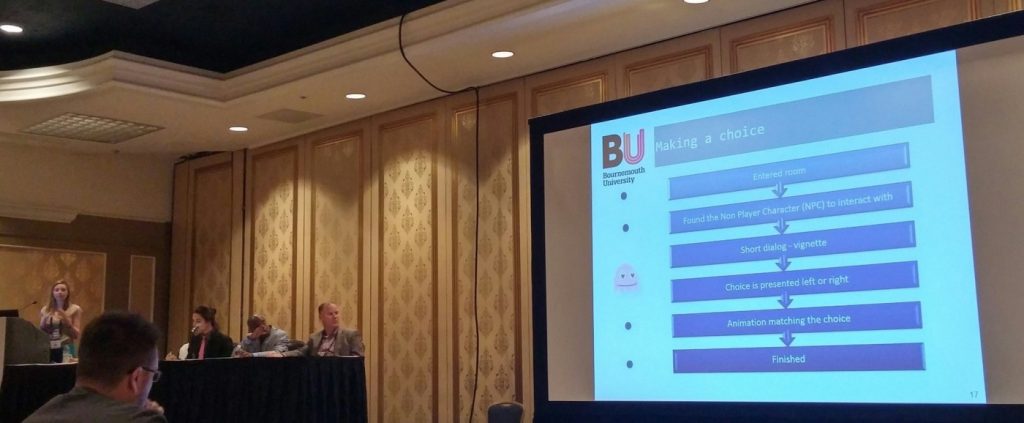 student paper. The research presented was funded by the University Student Research Assistant (SRA) scheme, which involved collaboration between departments and faculties. The research involved creating a game to measure in-game moral decisions. The research team included Jacqui Taylor and John McAlaney from the Department of Psychology, Davide Melacca and Christos Gatzidis from the Department of Creative Technology, and Eike Anderson from the National Centre for Computer Animation.
student paper. The research presented was funded by the University Student Research Assistant (SRA) scheme, which involved collaboration between departments and faculties. The research involved creating a game to measure in-game moral decisions. The research team included Jacqui Taylor and John McAlaney from the Department of Psychology, Davide Melacca and Christos Gatzidis from the Department of Creative Technology, and Eike Anderson from the National Centre for Computer Animation.
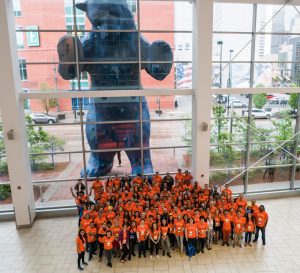
At the second conference Computers in Human Interaction (CHI), Sarah had a workshop paper accepted on Ethical Encounters in Human Computer Interaction and this naturally stimulated many interesting questions about ethics in research. Sarah was a student volunteer at the conference. Sarah was a Chair student Volunteer at British HCI 2016 that was held at Bournemouth University last summer and this experience supported being accepted as a Student Volunteer at CHI. From this experience Sarah was assigned the role of Day Captain, which involved supporting and overseeing the other student  volunteers with their duties. Sarah found it to be a great experience and highly recommends other students to consider being a student volunteer as a great chance to network and it also helps with funding conferences as the registration fee was waived.
volunteers with their duties. Sarah found it to be a great experience and highly recommends other students to consider being a student volunteer as a great chance to network and it also helps with funding conferences as the registration fee was waived.
Hodge, S. Taylor, J & McAlaney, J (2017). Restricted Content: Ethical Issues with Researching Minors’ Video Game Habits Human in Computer Interaction (CHI) May, Denver USA
If you would like more information about the research please contact: shodge@bournemouth.ac.uk
CEMP research published by Samsung

CEMP’s Digital Capability study has now been published by Samsung.
The genetics of psychiatric disorders
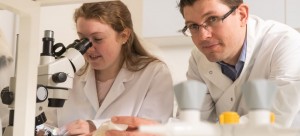
It’s British Science Week 2017 and to celebrate we’re sharing some of our science research stories, to highlight some of the fantastic research taking place here at BU. Today we’re looking at how a team of BU researchers are uncovering the genetics of psychiatric disorders.
While it has long been recognised that genetics – alongside environmental factors – play a role in developing psychiatric disorders, the function of individual genes is still largely unknown. But an international, multi-disciplinary team led by Bournemouth University’s Dr Kevin McGhee is aiming to uncover just that – using fruit flies to isolate and examine the genes involved in the development of schizophrenia, with the hope of improving knowledge and treatments for the condition.
“In psychiatric genetics, a lot of time and money has been invested in large, genomewide studies to find the genes that are involved,” said Dr McGhee, a Senior Lecturer in Health Sciences at Bournemouth University (BU). “Now, we want to find out what the functions of those genes are. If you can do that, the ultimate impact is that you can then design better treatments.” Dr McGhee is the principal investigator of the year-long project, working alongside colleagues from the National University of Ireland, Galway and University of British Columbia, Vancouver.
Students are also playing a part in the Bournemouth University funded project, with a number of dissertation students trained to carry out lab-based examinations of the fruit flies. They will isolate and switch off genes that human data has previously indicated play a role in schizophrenia, before examining the effect on the flies’ nerve cells at different life stages.
“If we can prove that it works and can be applied to human psychiatric genetics, then it helps create a cheap and easy functional model that is beneficial to everyone,” explained Dr McGhee. “I believe what we find out from these genetic studies will help infer what is going on biologically, and that will ultimately lead to better treatment.”
Another strand of the research will help kickstart the use of psychiatric genetic counselling in the UK. Genetic counselling – where patients and relatives are given advice and support around the probability of developing
an inherited disorder – has long been used to assess the risks around conditions like Down’s Syndrome and certain cancers.
A psychiatric genetic counselling workshop – the first of its kind – is being held by the research team. It will explore how best to translate the increasing knowledge about the genetics of psychiatric disorders into educational and counselling-based interventions to improve outcomes for patients and their families.
“Genetic counselling will probably expand over the next ten or 20 years and we want to put BU at the forefront, as a UK leader in the field,” said Dr McGhee, adding that the workshop has already attracted interest from around the world. “I think people having that education and training to be able to explain and support people through diagnosis will lead to better treatments and help reduce that sense of stigma and guilt around
psychiatric disorders.”
Open access publishing is another way in which Dr McGhee believes that the wider public can benefit and learn from research projects. “Impact is really important for research and open access really helps to achieve that – as anyone can see it, whether they are students, doctors, charities, policy makers, whoever,” he said. “I think, hopefully, another impact of this work will be to better show where we are with this research, which again goes back to open access – helping people to see that there are hundreds of markers and hundreds of genes and they each have a very small effect.
“Ultimately, we want to educate the healthcare professionals, policy makers and eventually the public – the patients and families who suffer from psychiatric diseases –
so that they are better informed.”
This article appeared in the 2015 Bournemouth Research Chronicle. Download a copy of the magazine, or view the articles online.
Dr McGee is currently working on the HEIF funded project Psychiatric Genetic Counselling . The project is looking at improving UK psychiatric services by expanding local and regional healthcare professionals’ understanding of the role genetics plays in mental illness. Through Psychiatric Genetic Counselling they’re looking at empowering mental health sufferers and their families.
Going for Gold: 3D Printing, Jewellery and the Future of Intellectual Property Law
Date: Friday 24 March 2017
Time: 10.00 am – 5pm
Venue: EB708, Executive Business Centre, Bournemouth University
The event is free to attend, however, places are limited and registration is required.
About the Event:
Additive Manufacturing or 3D printing as it is more commonly known, continues to push the boundaries of Intellectual Property (IP) law whilst raising questions relating to the protection and exploitation of IP.
There have been various attempts to address these questions through legal and empirical studies; yet at the same time, there continues to be limited literature and debate on the implications of 3D printing surrounding IP law, industry, society, technology and policy.
This challenge, which extends to the lucrative jewellery sector raises further questions in relation to creativity, design, copyright and licensing and these issues will be addressed at the event by bringing together experts from the cultural and business sectors including designers, manufacturers, distributors, policy makers and legal professionals.
This multi-disciplinary event which will explore the above issues will also provide the platform for a discussion of the ‘Going for Gold’ project carried out by researchers at CIPPM (Bournemouth University) in collaboration with Museotechniki Ltd and Uformia AS and will be complemented by a demonstration of 3D printed jewellery artefacts resulting from the project.
The event, based on the ‘Going for Gold’ project led by Professor Dinusha Mendis, is supported by the RCUK funded Centre for Copyright and New Business Models in the Creative Economy (CREATe), AHRC Grant Number AH/K000179/1 and builds on the BU/CIPPM-led UK Intellectual Property Office (UKIPO) Commissioned Study on 3D Printing and IP law completed in 2015.
Confirmed Participants and Speakers:
Mark Bloomfield (Electrobloom); Roger Brownsword (Bournemouth University / Kings College London); Ruth Burstall (Baker & McKenzie LLP); Frank Cooper (Jewellery Industry Innovation Centre, Birmingham Jewellery School); Lionel Dean (De Montfort University); Damian Etherington (Ipswich Museum); Nikolaos Maniatis (Museotechniki Ltd); Dids McDonald (Anti Copying in Design); Dinusha Mendis (Bournemouth University); Cherie Stamm (Uformia AS); Andrea Wallace (CREATe, University of Glasgow); Michael Weinberg (Shapeways Inc).
For inquiries, please contact Dinusha Mendis at dmendis@bournemouth.ac.uk
Innovation in sport: breaking through the white-water
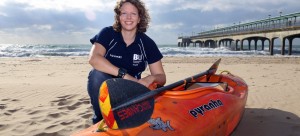 It’s British Science Week 2017 and to celebrate we’re sharing some of our science research stories, to highlight some of the fantastic research taking place here at BU. Today we’re looking how we’re breaking down the barriers in kayaking for women.Kayaking originated as a method of hunting on rough seas for Arctic Inuit tribes. It was later popularised in the UK by Scottish sportsman John MacGregor, known as Rob Roy, who wrote about his many voyages in a canoe more than 150 years ago, before his death in Bournemouth in 1892.The sport has, ever since, exhibited a more male-dominated history, with only 18% of UK kayakers being female in 2013, according to figures from Sport England.An early career researcher at BU is researching the design of kayaks, focussing on understanding how anthropometric enhancements, such as seating height within the craft, can affect the performance and paddling efficiency of white-water kayaks for women. Shelley Ellis, an academic and Lecturer in Biomechanics and Performance Analysis, became interested in the subject as she saw the challenges facing women in kayaking first-hand.
It’s British Science Week 2017 and to celebrate we’re sharing some of our science research stories, to highlight some of the fantastic research taking place here at BU. Today we’re looking how we’re breaking down the barriers in kayaking for women.Kayaking originated as a method of hunting on rough seas for Arctic Inuit tribes. It was later popularised in the UK by Scottish sportsman John MacGregor, known as Rob Roy, who wrote about his many voyages in a canoe more than 150 years ago, before his death in Bournemouth in 1892.The sport has, ever since, exhibited a more male-dominated history, with only 18% of UK kayakers being female in 2013, according to figures from Sport England.An early career researcher at BU is researching the design of kayaks, focussing on understanding how anthropometric enhancements, such as seating height within the craft, can affect the performance and paddling efficiency of white-water kayaks for women. Shelley Ellis, an academic and Lecturer in Biomechanics and Performance Analysis, became interested in the subject as she saw the challenges facing women in kayaking first-hand.
“My research looks specifically at kayak sitting height – it’s about trying to identify whether adapting sitting height in a white-water kayak can make our paddle strokes more efficient. It’s really borne out of my personal background as a kayaker and the challenges I’ve faced,” explains Shelley.
Having been around the kayaking community for some time, Shelley had heard many coaches suggest that seating height should be raised in order to improve performance, but discovered that there was no follow-up guidance about how much to raise the seat by. It tends to be based on trial and error, rather than taking into account an athlete’s height, body shape and size.
“Because historically kayaks have been predominantly designed with male participants in mind and we can’t change that or make the kayak different at this point in time, we have to make what we have more accessible to all users,” says Shelley, “We already know that by altering sitting height it will effect a chain of contact points within the kayak, however we don’t know how high it has to be to improve efficiency overall.”
Women tend to have a shorter torso length and shorter arms, which gives them a smaller lever to paddle the boat through water. If the sitting height is changed, then this means women have a different torso height, enabling them to have better leverage when paddling.
“My research is all about making sport, in this instance kayaking, more accessible to female participants. The number of women taking part in kayaking is considerably lower than men, although the female population in kayaking is growing much faster than males.
“It’s really about breaking down those barriers on the basis that equipment wasn’t originally designed for women – sport should be accessible for everyone and can be with our scientific knowledge. If we’re able to say that based on height and arm span, for example, we are able to calculate an altered seat height to enable a kayaker to be more efficient, this can help them to progress to the next level of their sport.
“If you look back to the Olympic and Paralympic Games, there are many names of female athletes that come to mind, from Jessica Ennis-Hill and Laura Trott to Sarah Storey and Ellie Simmonds, these now well-known names are helping to change perceptions of what is and isn’t achievable. But these successes didn’t happen by accident – alongside incredible athletes, a lot of science and research has taken place and this has also helped to understand how equipment should be setup for each athlete.
With these role models, even more people are likely to get involved in sport. As all of kayaking’s history has come from a male background, what we now need is for manufacturers to catch up to the fact that it is becoming more popular for women.
“We’re very lucky in the way that we think at BU – we’ve got a lot of academics here who feel that research is important but are also keen to make it relevant and useful. We want to make sure that our research will be used by people and through engaging people with that process, we can ensure that it has a further reach in the long run.
“I’m supported by a local kayaking business, South Coast Canoes, who give me access to participants and a place to share my research directly with the kayaking population in the form of workshops and talks. It really motivates me to solve this ‘challenge’ that female kayakers face as there are people telling me that this research is important, and that they need the answers to move forward in the sport.”
This story featured in the 2017 Bournemouth Research Chronicle, which can be read in full here.
Energy: developing reliable renewable energy sources
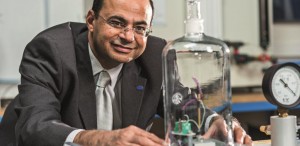
It’s British Science Week 2017 and to celebrate we’re sharing some of our science research stories, to highlight some of the fantastic research taking place here at BU. Today we’re looking at how BU researchers are working to develop reliable and renewable energy sources.
As the world’s population continues to grow, so does our consumption of natural resources. Many of these resources are non-renewable, so research into renewable sources of energy is vital. Research led by BU’s Professor Zulfiqar Khan is tackling this issue through reducing corrosion, improving heat transfer and fluid dynamics, and using nano coatings to enhance surface effiencies in renewable energy systems.
The European Union’s (EU’s) Renewable Energy Directive states that the EU should be producing 20% of its energy from renewable sources by 2020; a challenging target for any country. Professor Khan’s research is a direct response to this initiative and to the challenge of finding sustainable and renewable ways of meeting our future energy needs. His research is supported by a team of PhD students, many of whom are fully or part funded by industry and international HEI partners.
One of his major areas of focus is developing solar thermal technology, solar energy is available abundantly due to its nature. “Currently, we are very reliant on Solar Photovoltaic for our solar panels, but we do not have a large supply of the materials used, so using it won’t be sustainable over a long period,” explains Prof Khan. “I am developing means of using readily available and sustainable materials to be applied in flat plate solar thermal systems through a combination of thermofluids with nano additives and efficient thermal storage, which will help meet our future energy needs. I am also looking at ways to move away from standalone panels to integrating them within standard building practices.”
Professor Khan explains the different components in the system: “There are four parts to this system. One part focuses upon generating heat for colder climates, while within warmer climates it focuses on generating electricity. The third part of the project looks at thermo-fluids, with the aim of improving the efficiency of fluids within the solar energy system. The final part will be the integration of heat storage and recovery system from waste.”
At the moment Professor Khan and his team of PhD students and Post Docs are testing the system for generating electricity in warmer climates. Funding from industry has allowed Professor Khan and his team to set up labs in Poole, which include a scale model of the solar thermal system – an invaluable tool for testing. The first two phases of heat generation in cold climates and generating electricity in warmer climates have been successfully commissioned. The third and fourth phase of optimisation of thermo-fluids and heat storage are in progress.
The very nature of the programme and its complexity means that an interdisciplinary approach is vital. Professor Khan’s research combines materials sciences (nano coatings), mechanical engineering (heat transfer and thermodynamics), and electrochemistry (corrosion). “It is the combination of several subjects and disciplines which guarantees the delivery of objectives of this very challenging and exciting programme, which will put BU in particular and the UK in general on the international map as a leader in developing clean energy technologies,” says Professor Khan. “This is why we shouldn’t shy away from other disciplines as it can bring huge benefits and opportunities to research which will give it originality, significance and reach.”
The research and its interdisciplinary nature has the potential to make a significant difference to society as it presents a solution to one of the biggest challenges now facing us – how to meet our current and future energy needs. “I think we can learn to do without many things, but without energy, life as we know it would not be the same,” says Professor Khan. “With our current levels of consumption and the non-renewable sources we are using, our energy sources won’t last forever. If we look to the future, our energy reserves used at our current rates will last us perhaps another 50 – 60 years for oil and gas, and coal another 100 years. What are we going to do when that runs out?”
You can read Professor Khan’s most recent publication on Thermodynamic modelling and analysis of a solar organic Rankine cycle employing thermofluids here
You can find more of Professor Khan’s publications on his staff profile.
The team would like to thank UK and International industry as well as HEI partners for providing funding and resources to enable their research to take place.
Interreg Opportunities
 Following the successful visit by UK Interreg Territorial Facilitators to BU on 21st February 2017, please find out more about the current Interreg call, which is open from 1 March until 30 June 2017.
Following the successful visit by UK Interreg Territorial Facilitators to BU on 21st February 2017, please find out more about the current Interreg call, which is open from 1 March until 30 June 2017.
It is targeted at public authorities and non-profits
- National, regional or local authorities
- Other organisations in charge of defining and implementing regional policy instruments
- Non-profits
Projects must focus on one of these topics
- Research and innovation
- SME competitiveness
- Low-carbon economy
- Environment and resource efficiency
Support is available on the call website, including instructional videos, partner search, online project self-assessment, project feedback before submission and a demo of the application form.
If BU academics are interested in applying for this call, please contact Emily Cieciura, RKEO’s Research Facilitator: EU & International
HE policy update w/e 27th January 2017
Industrial Strategy Green Paper
The Government launched the Industrial Strategy Green Paper and consultation this week. The paper focuses on improving Britain’s innovation and productivity in key areas alongside upskilling the workforce to become world leading. The government suggest a number of areas of industry specialism that should be supported:
- clean energy
- robotics
- healthcare
- space technology
- quantum technology
- advanced computing and communications
The document frequently references the role of Universities as innovation leaders pushing for commercialisation and greater productive cooperation with business. It states that the ‘neglect of technical education’ should be redressed and insinuates that higher-level technical education will be pushed towards the new Institutes of Technology (£170 government investment announced – see below). There is an emphasis on rebalancing the difference in Britain’s economic geography through infrastructure investment. In addition, it criticises how UK research funding is currently heavily invested in the ‘golden triangle’ (Oxford, Cambridge, London) and calls to build on research strengths in businesses as well as other universities. The strategy has a strong focus on STEM and Wonkhe have reported that The British Academy are urging the government not to forget investment in social sciences and humanities teaching and research, which they argue are vital to the continued development of the UK’s services sectors.
The consultation ends in April, we’ll be in touch shortly about how you can contribute to a BU response.
While the strategy has only just been launched it was preceded by the announcement of the new Industrial Strategy Challenge Fund (Nov 2016) and consultative workshops. The workshops aimed to ensure that the challenges identified match UK business capability and are based on the best available evidence for scientific and commercial success on the global stage. The challenges mirror the industry specialisms proposed in the green paper but also mention the creative industries and integrated cities. The workshops conclude this week, implementation plans are expected to follow from the government and the first challenge is expected to be announced in March.
In an interesting article in The Conversation Graham Galbraith, VC at Portsmouth, urges Universities to shun new institutions for innovation and instead form a network of hubs building on relationships with employers, skills organisations and FE colleges. Furthermore he resists the government’s distinction between academic and technical education, seeing the productivity answer through flexible routes to university study and developing skills courses that employers need in accessible ways. He believes the university sector would deliver this far more quickly than new Institutes of Technology. Galbraith also criticises REF 2021: “The government wants the UK to be better at commercialising its world-class, basic research. But the… require[ment]…to include all academic staff…will have the effect of making universities re-balance their staff’s priorities so that there is more focus only on peer-reviewed research and less on outward-facing activities like business collaborations.”
Brexit –The Supreme Court has ruled that Parliament must vote to trigger Article 50 which begins the Brexit process. The government timescale is to trigger Article 50 by end of March and to this end they have introduced a European Withdrawal Bill (EWB). The European Withdrawal Bill gives the PM the power to notify the European Council of the UK’s intention to withdrawn from the EU through the required Act of Parliament. It is being fast tracked through Parliament. Parliamentary time is scheduled for 31 Jan, 1 Feb, 6-8 Feb. The House of Commons Education Select Committee continues visits to Universities (Oxford, UCL) to examine impact of Brexit on HE. At the UCL visit (Wednesday) Michael Arthur (Provost) broke the UCAS data embargo revealing a 7% drop in EU applicants in the current cycle. The Guardian leads with ‘first decrease after almost a decade of unbroken growth blamed on… Brexit’. Committee Chair, Neil Carmichael is reported on Twitter as asking whether HE needs a sector-specific Brexit deal – panel response ‘yes absolutely!’
Higher Education and Research Bill (HERB) – The Lords continue to scrutinise the HERB carefully with the long list of amendments. The list has stopped growing quite so quickly but new amendments proposed this week include one to set up a new UKRI visa department that will sponsor academics (507ZA). So far apart form the first one, no amendments other than government amendments have been passed, but the level of debate and the length of the list suggests that there may have to be some concessions by the government. James Younger, the government lead on the Bill in the Lords, wrote to Peers on 25th January about the bill.
Given the timing of the Brexit discussions, Wonkhe speculate that to achieve the timescales for the Bill and to clear sufficient parliamentary time for the European Withdrawal Bill to be passed the government may make concessions on HERB. Key discussions this week:
- NSS statistically unfit for TEF – Lord Lipsey discussed the statistical inadequacies of NSS and the implication for this as a TEF metric. “The NSS in the TEF is using—or rather, abusing—statistics for a purpose for which the NSS was never designed.” Lipsey acknowledged that the Government have gently retreated from the emphasis on NSS scores – in their latest instructions to assessors they stated: “assessors should be careful not to overweight information coming from the NSS“. This was reinforced by Chris Husbands, Chair of TEF, who informed a meeting at the House of Commons this week that his team would “not be overweighting the NSS” when awarding ratings this year. The proposed amendment was withdrawn after Viscount Younger: stressed the NSS was not the primary source of information for the TEF and that the framework was about much more than metrics. “Providers submit additional evidence alongside their metrics, and this evidence will be given significant weight by the panel”. HE continued: “we cannot ignore the only credible, widely used metrics that captures students’ views”.
- There were also debates about the gold/silver/bronze ratings and the government provided reassurance that Bronze was “above a high quality baseline”. This contradicts statements made by some in DfE before the final specification was agreed about Bronze institutions “needing improvement”. The panel have praised positive communication on this subject.
- Validation – The government have issued a factsheet for the Lords on Validation which provides explanation from the perspective of an alternative provider seeking to enter a validation arrangement. It describes Clause 46 of HERB, which gives the Office for Students (OfS) power to commission authorised HE providers to provide validation if other providers decline. It states such authorised providers are free to choose whether they wish offer this service, however once an arrangement is in place the OfS could require them to validate award) delivered by other registered HE providers. The commissioned arrangement would be made public. The controversial Clause 47 which appoints OfS as the validator of last resort was also discussed. The controversy arises as OfS isn’t an academic institution and doesn’t hold Degree Awarding Powers. The OfS will advise the Secretary of State (SoS) if intervention is required (likely through an evidence based report and stakeholder consultation) and the SoS would then authorise the intervention through regulation which is subject to parliamentary scrutiny.
- Contract Cheating – The amendment proposed by Lord Storey on contract cheating was withdrawn following Government reassurance. Lord Storey provided a passionate discourse including detailed sector information and cheating statistics. Baroness Goldie confirmed that the Government were addressing cheating referencing the (Aug 2016 published) QAA investigation and Jo Johnson’s commitment to close working to progress the recommendations. She revealed that the Minster would shortly announce a new initiative to tackle cheating in conjunction with QAA, Universities UK, NUS and HEFCE.
TEF
The 15 page written submissions for year 2 of the TEF were finalised and submitted this week, and this was the final opportunity for institutions to opt out of the TEF. Although there may have been others who have not published their positions, most Scottish Universities have opted out, as well as the Open University. Given the difference in the Scottish funding system they have less to gain from the TEF – but the 4 who have opted in have noted international reputation as a crucial factor. The OU explain their non-participation is due to the poor fit of the metrics with their social mobility demographic.
And the future of the TEF? According to Research Professional, a German academic has criticised the way that teaching excellence funding is being used in Germany.
“Whereas lower-ranked universities have tended to spread their funding from the programme thinly across faculties and courses, higher-ranked institutions have had the luxury of being able to focus on priority areas, the analysis found.
“You are starting to see emerging differences between disciplines taught at different universities,” Bloch told Times Higher Education on 17 January. For the first time, elite universities are starting to build up strong institutional identities when it comes to teaching, in an effort to get further ahead.
“It will be a long time before we reach the stratification that you see in the American system [around teaching], but we are seeing a difference for the first time in how resources in teaching are distributed,” he said.
UCAS 2016 entrants report – this data includes applications, offers and placed rates by sex, area background (LPN-polar 3), and ethnicity. BU’s report can be selected from the drop down menu towards the end of the webpage. The Guardian reports on the lower offer rates to black applicants. Wonkhe covers the HEIs that have a significant upward or downward trend in acceptances
Research Impact training: Parliament are running a Research, Impact and the UK Parliament event in Bristol on Wednesday 1 March. It covers the basics of the Parliamentary process and how academics can engage with parliament through their knowledge and research to inform scrutiny and legislation, including the impact of influencing policy to support REF submissions.
Wanted! External Bid Writers

As part of the Research and Knowledge Exchange Development Framework, Bournemouth University is expanding its pool of external bid writing expertise, through a tendering process.
If you have worked with a good bid writer or, as an external subscriber to this blog, you have written successful research funding applications, please contactus in the Research & Knowledge Exchange Office
We are particularly interested in those who can provide short courses, one-to-one support, bid writing retreats, application review or a range of these and related activities.
Examples of key funders include:
- British Academy
- European Commission funds including Horizon 2020
- Innovate UK
- Leverhulme Trust
- National Institutes of Health and other US Federal funders
- Research Councils
- Royal Society
- Wellcome Trust
- etc.
We look forward to hearing from you.
FHSS Dr. Pramod Regmi speaking in India
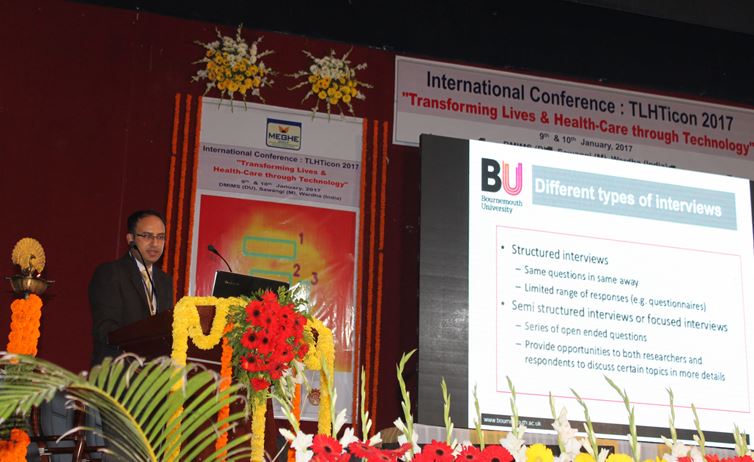 Two BU papers and a poster at the International Conference on Transforming Lives & Healthcare through Technology
Two BU papers and a poster at the International Conference on Transforming Lives & Healthcare through Technology
On 9th January 2017, I presented a paper entitled ‘Qualitative research in health technology assessment’ in a scientific session at the International Conference on Transforming Lives and Health Care through Technology (TLHTicon 2017), Wardha, India. This paper was prepared jointly with by Prof Edwin van Teijlingen and BU’s Visiting Prof Padam Simkhada (Liverpool John Moores University). At the same conference Mrs. Preeti Mahato’s poster on ‘Factors affecting health facility delivery in rural Nawalparasi, Nepal’ was also displayed. Preeti is a PhD student in FHSS. In another scientific session, BU visiting faculty Prof Padam Simkhada presented a paper around global public health and health technology assessment. Prof Edwin van Teijlingen and Dr Pramod Regmi co-authored this presentation.
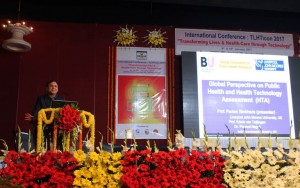
The conference, which attracted more than 180 oral scientific papers and 97 posters, was organized jointly by Datta Meghe Institute of Medical Sciences, DU, Datta Meghe Institute of Engineering, Technology & Research and Yeshwantrao Chavan College of Engineering in association with the Global Consortium for Public Health Research. The Global Consortium for Public Health Research was recently formed [1]. Prof Edwin van Teijlingen, Dr Pramod Regmi, both from HSS, BU are part of it among the 14 academics/researchers from UK, India, Bangladesh, Nepal and few other Low and Middle-Income Countries. Some of them are BU visiting faculty too. Unfortunately, Prof Edwin van Teijlingen could not get a visa in time for India, so he recorded a good-luck message. This pre-recorded message was played to the conference goers.
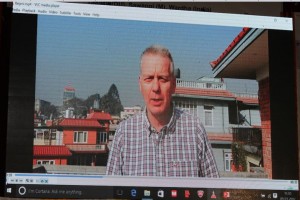
I found the scientific sessions were a nice blend of scientific talks, plenary sessions, symposia and scientific track sessions. Overall, this conference provided a much-needed platform for academicians, researchers, practitioners and professionals from medical, engineering and industry to disseminate their innovations in interdisciplinary field of health sciences through technology. The conference show-cased innovations in health-care through technology, which shall be useful in transforming lives of people in Low and Middle Income Countries. In these two days; I have been able to all refreshed with thought-provoking & informative talks rendered by experienced researchers around technology in health care.
Dr Pramod Regmi, Post Doc Research Fellow, HSS
Reference:
- Simkhada, P., van Teijlingen, E., Regmi, P.R. et al., 2016. Need and scope of global partnership on public health research. Journal of Datta Meghe Institute of Medical Sciences University, 11 (2), 202-204.
Congratulations to Dr. Sarah Collard on new publication
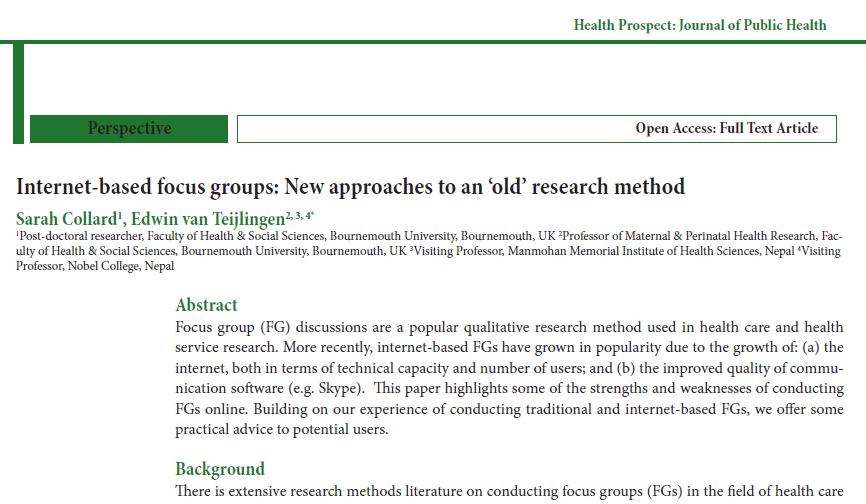 Today saw the publication of a new methods paper by Dr. Sarah Collard, post-doctoral researcher in the Faculty of Health & Social Sciences (FHSS) and Prof. Edwin van Teijlingen in the academic journal Health Prospect. This new paper addressed some of the key methodological issues associated with Internet-based Focus Groups (FGs) or the so-called Online Focus Group Discussions [1]. Traditional face-to-face FG discussions are a popular qualitative research method used a wide-range of areas, such as political sciences, marketing, health service research and sociology to name but a few disciplines. More recently, internet-based FGs have grown in popularity due to the growth of: (a) the internet, both in terms of technical capacity and number of users; and (b) the improved quality of communication software (e.g. Skype). This paper highlights some of the strengths and weaknesses of conducting FGs online. Building on our experience of conducting traditional and internet-based FGs.
Today saw the publication of a new methods paper by Dr. Sarah Collard, post-doctoral researcher in the Faculty of Health & Social Sciences (FHSS) and Prof. Edwin van Teijlingen in the academic journal Health Prospect. This new paper addressed some of the key methodological issues associated with Internet-based Focus Groups (FGs) or the so-called Online Focus Group Discussions [1]. Traditional face-to-face FG discussions are a popular qualitative research method used a wide-range of areas, such as political sciences, marketing, health service research and sociology to name but a few disciplines. More recently, internet-based FGs have grown in popularity due to the growth of: (a) the internet, both in terms of technical capacity and number of users; and (b) the improved quality of communication software (e.g. Skype). This paper highlights some of the strengths and weaknesses of conducting FGs online. Building on our experience of conducting traditional and internet-based FGs.
Dr. Sarah Collard is affiliated with BU’s Centre for Qualitative Research (CQR). Health Prospect is an Open Access journal therefore this article is freely available to any reader across the globe.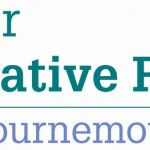
Reference:
- Collard, S., van Teijlingen, E. (2016) Online focus group: New approaches to an ‘old’ research method, Health Prospect 15(3):4-7.
Call for Papers for 2017 Nepal Study Days at Bournemouth University
Call for Papers for the 15th Nepal Study Days
12-13 April 2017 hosted by Bournemouth University, UK
The Britain Nepal Academic Council (BNAC) invites scholars and practitioners from all disciplines to participate in the 15th BNAC Nepal Study Days. All presentations should focus on Nepal, its diaspora and/or the Nepali cultural world. We invite presentations that share research findings, preferably of work that has reached an advanced stage or has been completed. The 2017 event will be held in Bournemouth House at Bournemouth University. Details of previous study days can be accessed online here! We also invite proposals for research posters.
If you are interested in participating, please send a 300-word abstract of your proposed presentation to bnacstudyday@gmail.com by 28th February 2017. The Study Days organizing committee will review the proposals received on time and make a selection. Selected abstracts will be circulated to registered participants in advance and posted to the BNAC website.
Members of BNAC may attend the Nepal Study Days for free, though we will ask for a contribution towards the costs of the lunches. For non-members there will be a registration fee of £25, which will include lunch on both days.
We would like to encourage prospective participants to apply for or renew their membership for 2017 in time to be eligible for free registration. To download membership application form and for other details about BNAC membership, please visit www.bnac.ac.uk/membership/.
We hope to be in a position to offer small bursaries towards the travel costs of students from outside Bournemouth whose abstracts are accepted.
Deadline to submit abstracts: 28th February 2016.
Deadline to register for those who are not presenting a paper but who wish to attend: 4th April 2017.
For more information and registration, please contact the Nepal Study Days organizing team (Pramo Regmi, Jib Acharya, Preeti Mahato and Edwin van Teijlingen) at bnacstudyday@gmail.com.
The application form can be found here!
We suggest you book your accommodation in Bournemouth well in advance. To download the list of hotels close to the programme venue, click here.
For details about new membership application (and to download forms) or renewal, click here
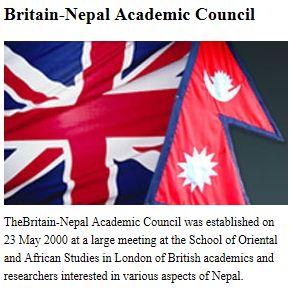
Prof. Edwin van Teijlingen
Dr. Pramod Regmi
Mr. Jib Acharya
Mrs. Preeti Mahato
New blog on Open Access publishing
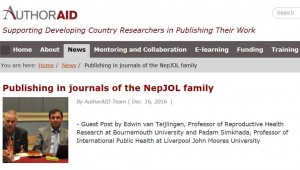 Some months ago Andy Nobes asked my colleague Prof. Padam Simkhada and I if we could write a blog about why we had so many papers in freely available online journals in Nepal. Andy is the Programme Officer, Research Development & Support at INASP, which is an international development charity based in Oxford working with a global network of partners in Africa, Latin America and Asia.
Some months ago Andy Nobes asked my colleague Prof. Padam Simkhada and I if we could write a blog about why we had so many papers in freely available online journals in Nepal. Andy is the Programme Officer, Research Development & Support at INASP, which is an international development charity based in Oxford working with a global network of partners in Africa, Latin America and Asia.
We had a whole range of immediate answers to Andy’s question, including ones like: we both love Nepal; we are on the editorial board of a few journals that are part of the NepJOL group; and editors invite us to submit articles and/or editorials. Moreover, we feel reasons for Open Access publishing are very similar to our key reasons for working in a low-income country like Nepal. These principles are (a) conducting applied academic research in low-income countries for the greater good; (b) helping to build research-capacity; and (c) telling the world about our research through quality academic publications. This week saw the publication of our blog ‘Publishing in journals of the NepJOL family’ on the AuthorAid website, click here to read the post.
Edwin van Teijlingen, Professor of Reproductive Health Research at Bournemouth University and Padam Simkhada, Professor of International Public Health at Liverpool John Moores University and BU Visiting Faculty.
Congratulations to Dr. Regmi new publication
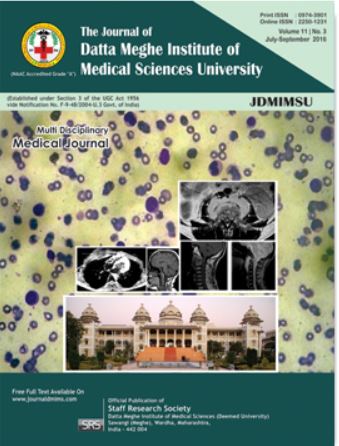 Congratulations to Dr. Pramod Regmi in FHSS on the publication of the editorial ‘Need and Scope of Global Partnership on Public Health Research’ published this week. [1] As a global partnership, it is our intention to make a tangible impact upon major public health challenges, whilst strengthening the participating institutions in a sustainable manner. Our collaboration came to a consensus on a number of priority research areas, based on our strengths and collective experience and on our knowledge of the key global issues for the next decades (Table 1). The paper is led by BU Visiting Faculty Prof. Padam Simkhada and co-authored by another BU Visiting Faculty Dr. Bibha Simkhada. The editorial is in an Open Access journal hence freely available to any researcher or practitioner (or policy maker) with internet-access in our collaborating countries.
Congratulations to Dr. Pramod Regmi in FHSS on the publication of the editorial ‘Need and Scope of Global Partnership on Public Health Research’ published this week. [1] As a global partnership, it is our intention to make a tangible impact upon major public health challenges, whilst strengthening the participating institutions in a sustainable manner. Our collaboration came to a consensus on a number of priority research areas, based on our strengths and collective experience and on our knowledge of the key global issues for the next decades (Table 1). The paper is led by BU Visiting Faculty Prof. Padam Simkhada and co-authored by another BU Visiting Faculty Dr. Bibha Simkhada. The editorial is in an Open Access journal hence freely available to any researcher or practitioner (or policy maker) with internet-access in our collaborating countries.
Table 1 : Key areas of research focus of the consortium
- Reproductive, maternal and child health
- Rural and urban comparisons (Equity and health)
- Nutrition
- Environment and health
- Health systems and health workforce
- Health, lifestyle and substance use
- Non-Communicable Diseases
- Preventable road traffic injuries and safety
- Disability
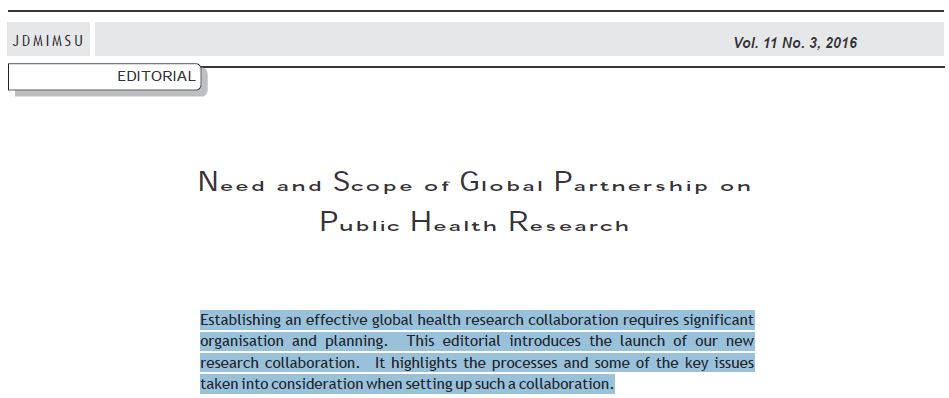
Reference:
- Simkhada, P., Poudel, A.N., Simkhada, B., Sumnall, H., Jones, L., Bista, S., McVeigh, J., Gaidhane, A., Zahiruddin, Q.S., Chowdhury, M.E., Bhuiyan, M.B.A.S., Iliyasu, Z., Pant, P.R., Kurmi, O., Hill, R., van Teijlingen, E., Regmi, P. (2016) Need and Scope of Global Partnership on Public Health Research, The Journal of Datta Meghe Institute of Medical Sciences University 11(3): 260-262.
Researcher in residence programme

Open call
Digital Catapult and the RCUK Digital Economy (DE) Theme is now accepting applications for the Researchers in Residence Programme, to be hosted at the Digital Catapult Centre in London or at one of the local centres (Northern Ireland, Yorkshire, Brighton and North East & Tees Valley).
Projects can either be applied or more strategic in nature:
Applied projects will generally be user-centred and focused on impact generation in the short to medium term. Proposals should be relevant to one or more of the current Digital Catapult technology layers.
Strategic projects will help shape current Digital Catapult projects, and drive the creation of new activities or projects relevant to Digital Catapult’s overall mission. Proposals that highlight potential new directions, new users and novel means of impact generation are encouraged. The focus should be impact generation in the broadest sense. Projects could be undertaken on either a full time basis or via a series of short secondments to Digital Catapult.
Eligibility: Open to those with a contract of employment at a UK university, or PhD students who have submitted their thesis by the closing date, Sunday 8 January 2017.
Timeline: The closing date is 23:59, Sunday 8 January 2017 with decisions due by early March. The programme will run until 2018, with two funding calls each year. The next round will open for applications in summer.
Funding: all residencies will benefit from a grant of up to £25,000 to cover expenses, including travel and accommodation.
Further information
- Application Form (word doc)
- Applicant Guidance (PDF)
- Impact Report Guidance (PDF)
Newsletter and more information about Digtal Catapult
SHIVA project progresses with innovation funding
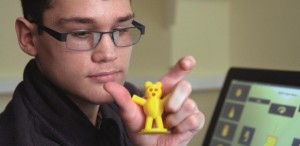
The SHIVA Project has received Higher Education Innovation Funding (HEIF) that runs for 12 months from August 2016 until July 2017. (HEIF 5+1+1.)
The HEIF funding will be critical in terms of supporting the development of networks locally, nationally and beyond. The key aims will be to link user groups and stakeholders in education, health and wellbeing related to children, young people and adults, through the creative digital innovations offered by the SHIVA project.
This project which brought innovative virtual sculpting tools to children with complex disabilities, enabling them to partake in creative digital activities from which they had previously been excluded was recognised in the Time Higher Awards last November winning the Outstanding Digital Innovation in Teaching or Research Category.
Originally the SHIVA project on 3D modelling and 3D printing for young people with disabilities was funded by the EU Interreg programme with the duration from 2010 to 2015.
The original project team worked with the Victoria Education Centre (VEC) in Poole. As the project ended in 2015, it was clear there was scope to take this project beyond the initial funding and the SHIVA project has successfully been awarded impact acceleration funding and more recently HEIF funding.
A new Research Assistant, Michelle Wu, an NCCA graduate (2016), is the latest member to join this team. Michelle will be involved in turning the SHIVA system into a deployable product with proper installation, configuration and usage instructions. This area of work will help make SHIVA accessible to all potential users in the UK and further afield and strengthen the potential for developing networks that will benefit from this award winning technology.
For more information on this project contact Alexander Pasko or Oleg Fryazinov within the Faculty of Media and Communication.
Jayne Codling within RKEO co-ordinates the HEIF project portfolio for BU. Feel free to contact Jayne if you have any questions regarding HEIF at BU or knowledge exchange activities including business engagement and innovation funding.
Bournemouth University Researchers Win ‘Innovation Oscar’ for Third Year in a Row
 Bournemouth University researchers Professor Venky Dubey and Dr Neil Vaughan have won a prestigious Information Technology Award at the IET Innovation Awards for their Orthopaedic Simulator.
Bournemouth University researchers Professor Venky Dubey and Dr Neil Vaughan have won a prestigious Information Technology Award at the IET Innovation Awards for their Orthopaedic Simulator.
Funded by the Wessex Academic Health Science Network, the simulator allows surgeons to practice on a virtual engineering-based hip model, which will improve safety and durability in hip replacements.
With the growing aging population, there are 66,000 hip replacements performed annually in the UK. The simulator helps to improve surgeon’s accuracy and skill, by enabling them to practice, which will reduce the amount of surgeries which dislocate. This number currently stands at 20%.
As well as being a considerable resource for trainee surgeons, the device will also enable current surgeons to improve their accuracy. The simulator will allow NHS surgeons to focus more on their patients, by freeing up consultancy time and reducing training costs.
The IET Innovation awards are considered a ‘Technological Oscar’ in science, engineering and technology.
The judging panel commented, “The simulator was an excellent entry that is receiving international acclaim in the important application of 3D technologies within the global health industry.”
The simulator has been developed by research undertaken in a partnership between Bournemouth University and Royal Bournemouth and Poole Hospital NHS Foundation Trusts.
When asked about the award Professor Dubey commented, “It is marvellous winning another innovation award. This is testimony of our hard work and ingenuity that we put in to our projects. This is the third year in a row that we have won the Innovation Awards,”
“This confirms that BU is second to none when it comes to innovation. We’d like to thank our collaborators and partners who have supported our projects over the years.”











 Beyond Academia: Exploring Career Options for Early Career Researchers – Online Workshop
Beyond Academia: Exploring Career Options for Early Career Researchers – Online Workshop UKCGE Recognised Research Supervision Programme: Deadline Approaching
UKCGE Recognised Research Supervision Programme: Deadline Approaching SPROUT: From Sustainable Research to Sustainable Research Lives
SPROUT: From Sustainable Research to Sustainable Research Lives BRIAN upgrade and new look
BRIAN upgrade and new look Seeing the fruits of your labour in Bangladesh
Seeing the fruits of your labour in Bangladesh ECR Funding Open Call: Research Culture & Community Grant – Apply now
ECR Funding Open Call: Research Culture & Community Grant – Apply now ECR Funding Open Call: Research Culture & Community Grant – Application Deadline Friday 12 December
ECR Funding Open Call: Research Culture & Community Grant – Application Deadline Friday 12 December MSCA Postdoctoral Fellowships 2025 Call
MSCA Postdoctoral Fellowships 2025 Call ERC Advanced Grant 2025 Webinar
ERC Advanced Grant 2025 Webinar Update on UKRO services
Update on UKRO services European research project exploring use of ‘virtual twins’ to better manage metabolic associated fatty liver disease
European research project exploring use of ‘virtual twins’ to better manage metabolic associated fatty liver disease